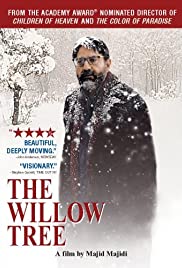
THE WEEPING WILLOW
Iran, 2005, 95 minutes, Colour.
Directed by Majid Majidi.
Majid Majidi is one of the Iranian directors who has a good reputation outside his own country. He has won numerous awards with his films Children of Heaven, Color of Paradise and Baran (all of which won awards from OCIC in 1997, 1999, 2001). His portrayal of children has been memorable.
While there is a child in Weeping Willow, the focus is on a middle-aged man who has been blind since the age of eight. He is a professor, leading a comfortable life, with a devoted wife, a little girl and a loving mother. What if his life were to change? How would he change? What would he change about his life. These are the questions the film asks. These are the questions the film offers some answers which can be both pleasing and disturbing.
SeTtings? are in affluent modern Tehran, with a trip to Paris early in the film. While the film is immersed in its culture, it is accessible to audiences around the world.
The film is beautifully crafted and boasts a superb performance by one of Iran's leading actors, Parviz Parastouie, a restrained performance which has moments of anguished outbursts. This is a complete contrast to his 2004 performance in the delightful comedy, The Lizard, where he is a petty criminal who has the chance to escape from prison in Mullah's dress and (like Whoopi Goldberg in Sister Act) is mistaken for a genuine holy man.
Underlying the film is a deep spiritual dimension and raises issues of prayer and answers to prayer and what we do in our choices with the answers to our prayers.
1. The title, reference, symbol? Luck, accident, blessing, misfortune?
2. The Teheran settings, the affluent suburbs? The streets? The transition to Paris, the hospital? The musical score and its emotion?
3. Majidi and his awards, the technical craft of his films?
4. The opening, the dark, the audience hearing voices only, Maryam and Yusef playing, the stick race, seeing them together, discovering that Yusef was blind? The significance of his voice-over, especially his secret, the revelation, the direct speech – and at the end the specific reference to God? His accident, blessings?
5. Yusef’s life, aged forty-six, his writing in braille, the attentiveness of his wife, his love for his child, his mother? The concern of his uncle? The house and his seeing it as a Paradise? His lecturing, being able to cope?
6. His collapse, the wind blowing the pages around the house and garden? Hospital, his wife and her remembering her first meeting, helping him find his ring? The back-story of his accident, eight, the fireworks? His going to Paris? His uncle and his help? Arrival, the friend, his room, the doctor and the result of the tests? The information about the possibility of recovery? The preparation, the operation?
7. His meeting Mortezza, the friendship, his broken tape after listening to his daughter, Mortezza offering to fix it, their walk, the trees, the search for the willow, the discussions about seeing and not seeing, Mortezza’s story, the shrapnel injury in the war, his gradually going blind? The photo of Yusef at the willow? His helping him?
8. The night, his wanting to take off the bandages, blood from his eyes, his joy in being able to see, the long corridor, his cautious steps, exultation and dance, being discovered by the nurses, back to bed? His going to Iran, the possibility for a new life?
9. On the plane, the arrival, the crowds greeting him, trying to identify his family, his mother not waving and her nodding, seeing his wife and Maryam, seeing Pari, looking at her, the impact? His being silent on his return, his uncle talking, the celebration and the meal, meeting the family and friends? Silent with his wife, the way he looked at her, walking to the house, the key, going inside, sleeping?
10. His being listless, not wanting to go back to the university, his wife persuading him to go to the school for the blind, his seeing the boys carrying the pots, opening the classroom door, their not knowing who was there, remembering his childhood? His wife and daughter and planting the flowers, their growth, his still not doing anything? The coloured pencils and Maryam teaching him? Looking at the photos, the photo of Pari? His being in the train, watching the pickpocket – not doing anything and the thief winking at him?
11. His reflecting on his life, the growing angers, the photo, his wife’s disappointment, her leaving – and visiting his mother and the compassion for the two women? His mother’s visit to him, his rage, throwing everything out, burning everything? The case into the pool – with his manuscript and prayer? His declaration to his mother, wanting a new life, suffering so much without complaint, saying that he deserved a new life?
12. His being alone, looking at Mortezza’s photo, reading his letter, the sudden loss of sight, his anguish?
13. The hospital, his losing his sight, his shouting and his anger, getting out of his uncle’s car, lost in the traffic, in the rain, with the stick and falling down in the mud?
14. Finding himself at home, going to the pool, finding his briefcase – but missing Mortezza’s photo of him? Getting out his document, reading it in braille, his prayer of asking God for the blessing and the possibility of a new life? The appropriate ending of the film at this moment?
15. The spiritual theme of a person with a disability, praying for a new life, getting it, failing? The role of God, blessing and providence?